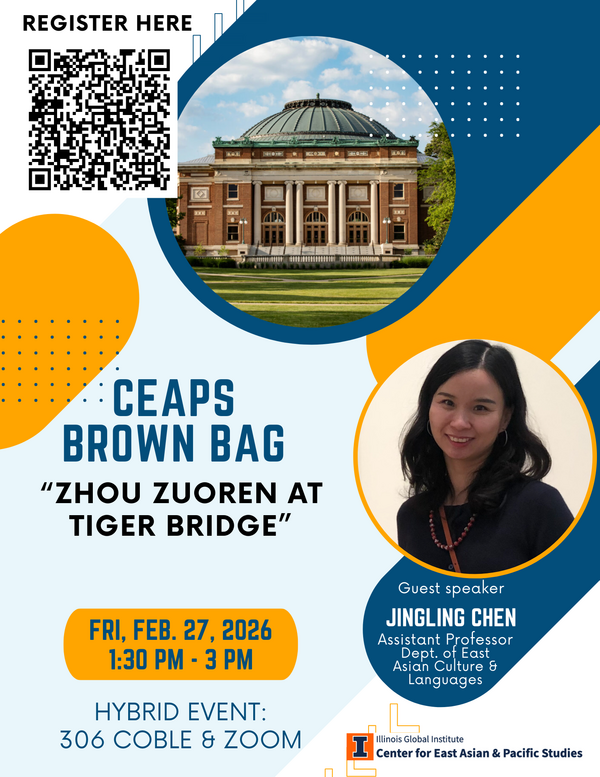
- Sponsor
- Center for East Asian & Pacific Studies
- Contact
- Yuchia Chang
- yuchia@illinois.edu
- Views
- 125
- Originating Calendar
- CEAPS Events Calendar
Join us for our HYBRID Brown Bag with Professor Jingling Chen from the East Asian Languages & Cultures Department at the University of Illinois Urbana-Champaign.
About the Speaker:
Jingling Chen received her Ph.D. at Harvard University and is teaching in the Department of East Asian Languages and Cultures at University of Illinois at Urbana-Champaign. Her interests include Chinese and Greek Comparative Literature, modern and contemporary Chinese narrative, and modern Chinese intellectual history. Her book on the Greek Imaginary and Chinese intellectual and cultural modernity An Acropolis in China: Modern China and Ancient Greece is forthcoming with Duke University.About the Talk:
This talk starts with a recently discovered scroll prepared by Zhou Zuoren (1885—1967)—one of the leading cultural figures of Republican China who infamously collaborated with the Japanese during the Second World War—for the historian Jin Yufu (1887—1962). The elegant piece of traditional calligraphy, in the size and style of a major decorative hanging, contains two ci lyrics by Zhu Dunru, whose life spanned the fall of Northern Song to the invading Jin, the Non-Han regime from the north. Jing himself had a controversial career: he took a series of positions in the Manchu puppet government after the September 18 Incident, and yet became an important cultural officer in the post-war Nationalist government.At a moment when his own life had reached its lowest point and his future remained uncertain, Zhou employed a mode of commutation reserved for the traditional literati: the calligraphic gift. Through it, he perhaps intended to reach out to an old acquaintance who might offer sympathy or intercession on his behalf. The deliberately chosen poems, lamenting the fall of the Northern Song through the imagery of an autumn evening—a classical metaphor for life’s brevity and limitation—reveal Zhou’s enduring bond with the tradition he once renounced, while also suggesting a veiled self-defense in the face of analogous historical turbulence. The modern intellectual thus staged a profound dialogue with a classical poet, his verses, and the tradition itself.
Moreover, the preparation and possible delivery of this scroll also provides a lens into the life of Tiger Bridge prison in the late 1940s. This facility, which housed many of the most notorious national traitors—most of them highly educated intellectuals—became a site of intense national scrutiny. It also fostered unusual forms of intellectual exchanges, both among the prisoners and with the outside world. Bearing witness to their struggles, dilemmas, and regrets, Tiger Bridge became an extraordinary chronoscope for studying the intellectual history of modern China.
------------------------------------------------------------------------------------------------------------------------------------------------------------------
Free speech and academic freedom are foundational to our university’s missions of discovery and exploration. Questioning ideas, posing alternative opinions and presenting different perspectives is how we create knowledge and help everyone to have more meaningful engagement with the world around them. Hosting an event does not imply or signify the university’s endorsement, sponsorship, approval or disapproval of the views expressed in the event.